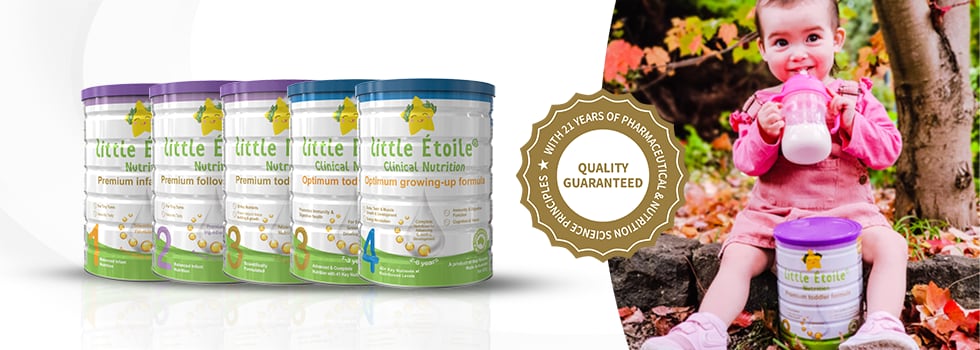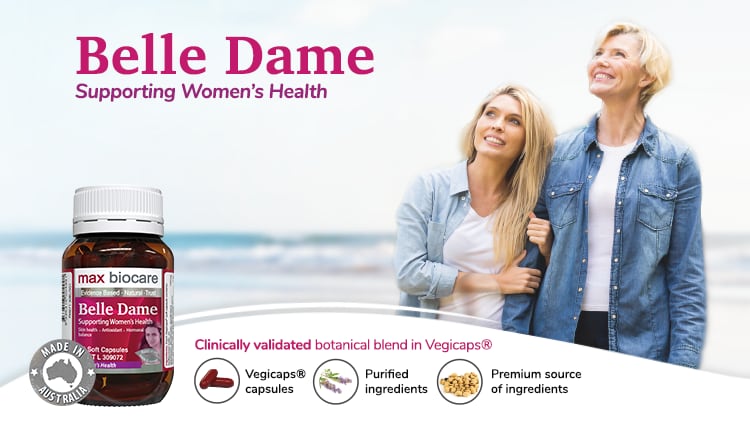Consumers rely on industry to provide safe and effective nutritional products for their children. Asian parents tend to be more sensitive to their infants’ and children’s nutritional needs. This may be based on an awareness of the health consequences of undernutrition, especially in developing countries.
UNICEF estimates that 31.5% of children under 5 in ASEAN countries are affected by growth stunting, while 38% suffer from anemia[1]. These are problems caused by undernutrition or an absence of key nutrients in the diet. Meanwhile, overnutrition is on the rise, and although it is a sign of emerging economic prosperity, it quite often means more empty calories and less nutrient value.
One assumption is that Asian parents want their children to grow up strong and smart, so they see infant and children’s nutrient milk products as a convenient way of providing all the essential nutrients to support physical and intellectual development.
What do the experts say?
To gain a better understanding of what Asian moms’ awareness of this product area, a survey was conducted by Max Biocare Pty Ltd across its key markets during March and April 2021. A total 2,334 mothers voluntarily participated in the survey through social media channels, and mostly moms residing in Asia (84%), with a small group (16%) of Aussie and American moms.
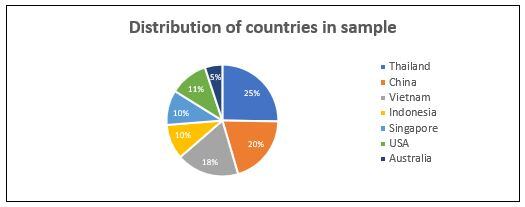
When asked which single benefit was the most important in a children’s milk, more than half (57%) chose either brain health (29.1%) or immune health (27.8%). Growth/height gain (18.8%) and gut health (18.6%), were equal second, followed lastly by eye health (5.5%) as a five-optioned question.
This trend toward immune health is understandable, in view of the global Covid pandemic, when parents are apparently conscious of the functional and growth deficits that occur during acute illness.
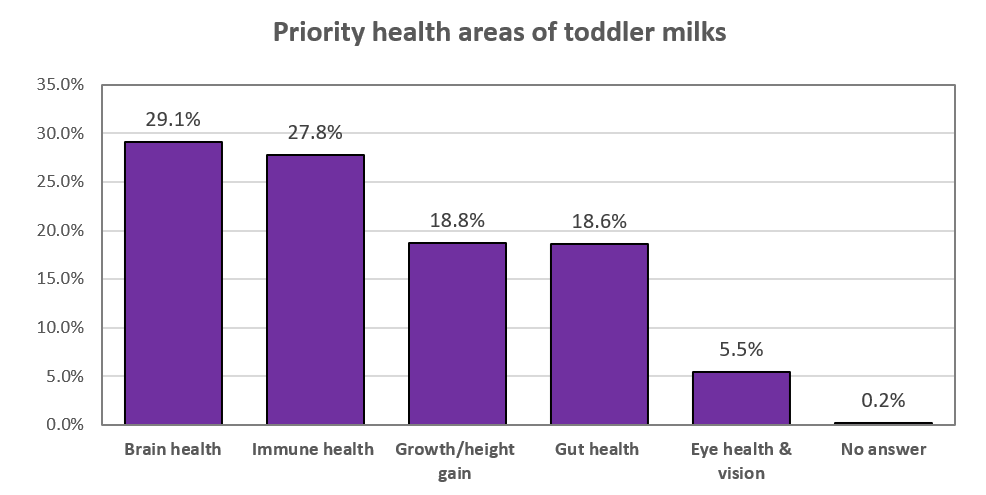
Amongst the countries in the APAC region, Singapore topped the list of those focused on immune benefits, followed by China, Australia, Indonesia, Vietnam and lastly Thailand. Surprisingly, not even 10% of US respondent considered immunity to be of major concern.
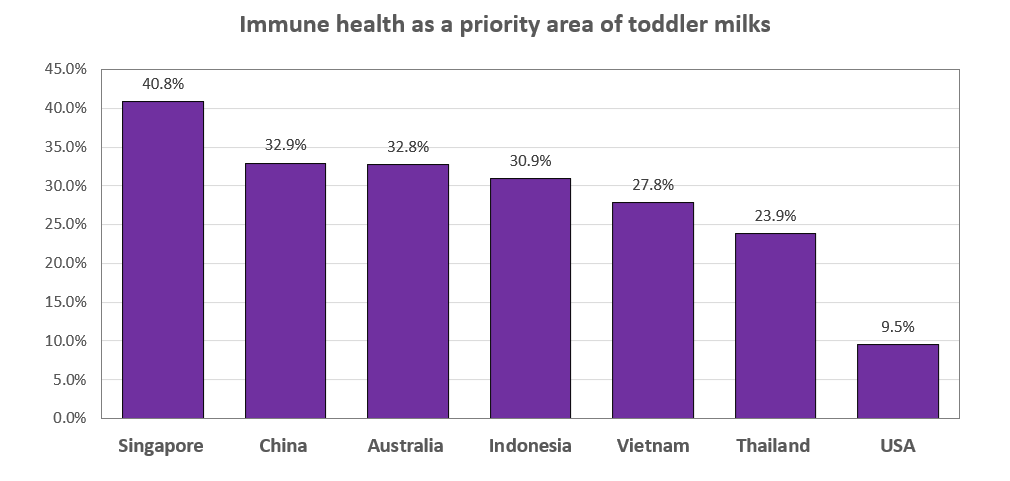
Mothers were also unanimous about children’s milk products that played a protective role in seasonal infections. A vast majority of respondents answered positively, when asked whether it was important to them that a milk product should help to prevent colds & flu in children.
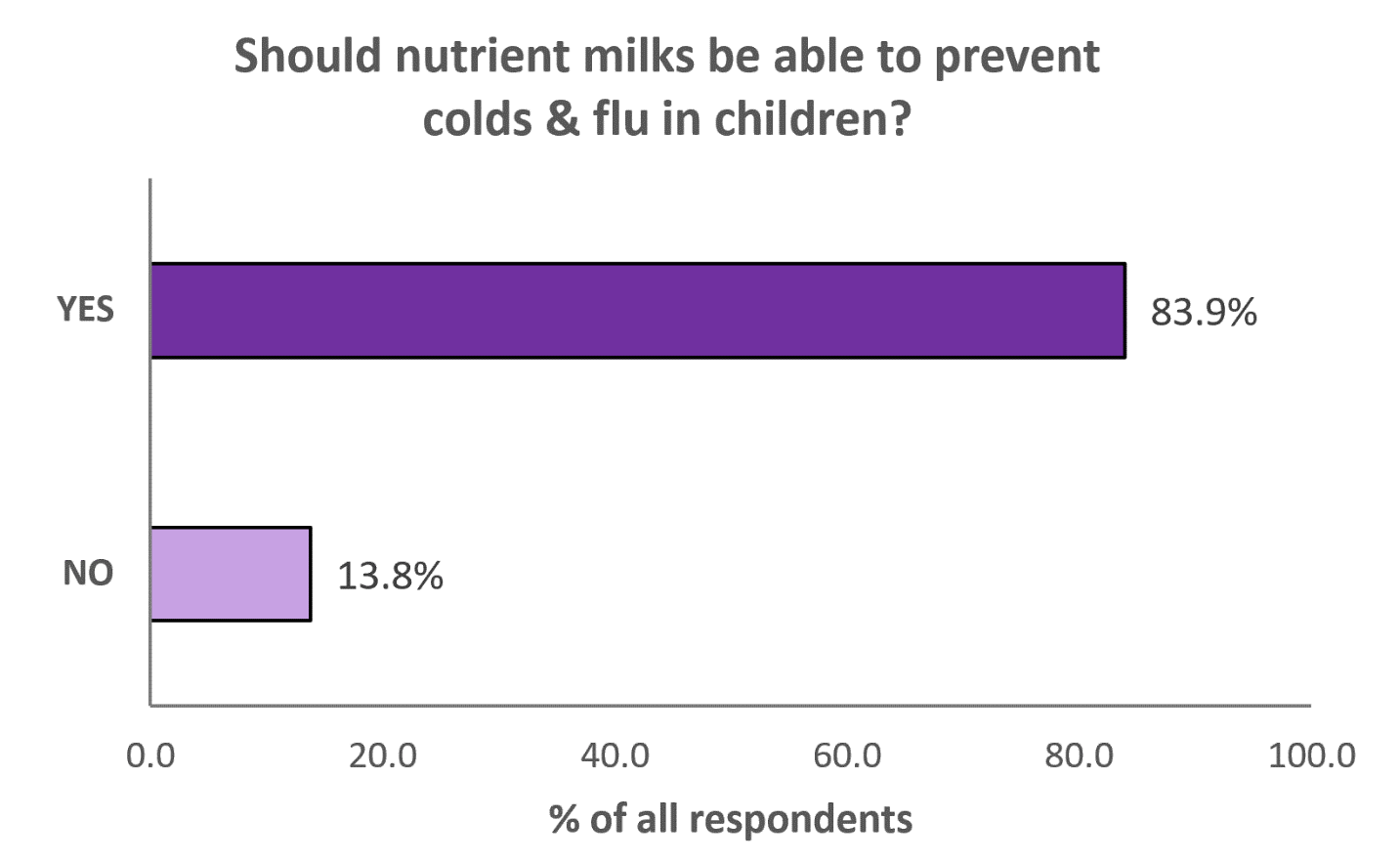
Above all aspects, the survey found that nutrition was still way out in front of all other product factors, at 51%, followed closely by brand trust and product shelf life. This is likely to indicate the perceived awareness of the links between good nutrition and all aspects of child health, which is hard to achieve when juggling the work-life balance.
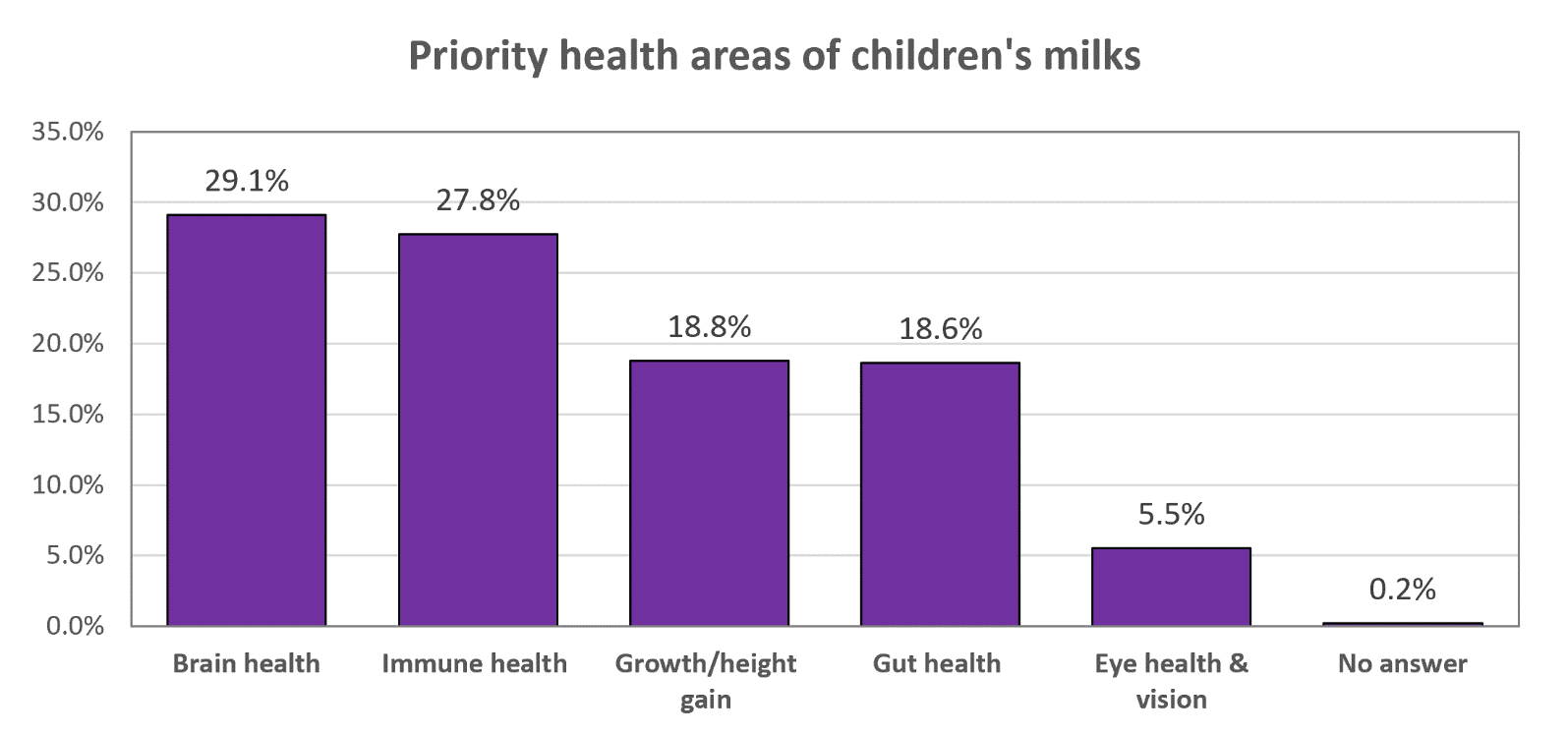
Taken together, these results point to an international recognition that nutrient formulas serve an important health purpose as a supplemental dietary source of essential nutrients for children, beyond the marketing hype.
Some limitations of the study included that not all APAC countries were represented, that focus was on children’s rather than infant health and that the findings were not peer-reviewed. Nevertheless, the study was large enough to provide a valuable glimpse into Asian consumer understanding of how child nutrition impacts child health and wellbeing, in a fast growing, busy and often confusing market segment.
Immune and brain health in front
So, it appears that immunity and cognitive ability are the two main areas that nutrient milks are expected to support. This suggests that moms are more focused on their children’s scholastic achievement, given that infection or illness means more days off school or early learning environments.
The immune health trend is not new, given the increasing inclusion of functional ingredients with immune boosting properties, and enrichment of nutrients with immune roles. Also, given the awareness of the importance of the gut microbiome in supporting immune health, and the gut-brain axis.
Some examples of functional ingredients in nutrient milk products include:
Lactoferrin
Lactoferrin is a special iron carrying protein found in the whey component of breast milk, particularly in the colostrum (first milk), and purified from clean, dairy sources. It is considered a first-line immune defense for the developing infant. Lactoferrin has been shown to lower the impact of colds & flu[2] and protects digestive function in children by preventing attachment of bad bacteria and supporting the growth of beneficial bacteria in the gut.
Lactoferrin also reduces the symptoms and duration of digestive symptoms related to viral infections in children, including vomiting and diarrhea, and overall symptom frequency[3]. Additionally, Lactoferrin also promotes the integrity of the intestinal lining and preventing the loss of nutrients.
Beta-glucans
This family of complex, undigested carbohydrates, is derived from whole grains, mushrooms and yeast extracts. It is known for its prebiotic effect and is able to stimulate the growth of different types of Bifidobacteria that populate the large intestine of infants and children[4]. Betaglucan also activates different types of immune cells in the small intestine and stimulates the body’s developing immune cells, especially those that clear viral infections.
The Wellmune™* form of yeast betaglucan is highly amenable to dry powder nutrient products, and has been shown in clinical trials to reduce cold and flu duration, the frequency of episodes and the need for antibiotics in 1 -4 year old children[5],[6].
Other micronutrients
Although all micronutrients have some role in maintaining the immune system, the main players include vitamin D, zinc, vitamin A, B-group vitamins and vitamin C. Vitamin D helps the body to make its own antibiotic factors for immunity. Zinc is the jack of all trades, essential for gut function, immunity, cell division and wound healing. Zinc deficiency is frequently associated with gut infections and diarrhea[7]. Vitamin A supports the integrity of mucous membranes in the nose, mouth, throat, lungs, gut and skin, and its deficiency increases the risk of measles and viral diarrhea[8].
Responding to consumer demands
Backed by 20+ years of experience in health and nutrition, Little Étoile’s comprehensive range of nutrient dense milk products, with 100% Australian grass-fed cow’s milk, were born out of a need to provide quality, scientifically validated and balanced nutrition for all phases of development, up to 6 years.
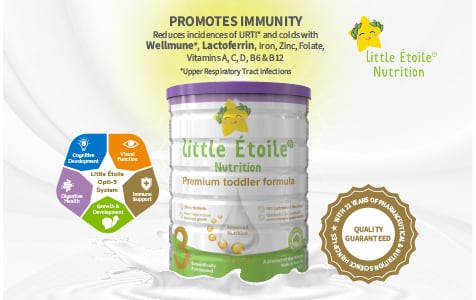
Little Étoile Nutrition is developed based on the Opti-5 System, which focuses on supporting five key areas of health, including growth, immunity, cognition, gut health and vision. The range is enriched with essential nutrients and designed specifically for each age group, with the Little Étoile Nutrition’s children’s and growing up products providing the highest level of omega-3 DHA/EPA, protein and other essential nutrients, with the added support of immune factors including lactoferrin and Wellmune™ beta glucan.
*Wellmune is a registered trademark of Kerry Group
References
[1]https://www.unicef.org/eap/media/1321/file/Regional%20Report%20on%20Nutrition%20Security%20in%20ASEAN%20Volume%201%20and%202.pdf
[2]Manzoni P et al. Role of Lactoferrin in Neonates and Infants: An Update Am J Perinatol. 2018 May;35(6):561-565. doi: 10.1055/s-0038-1639359. Epub 2018 Apr 25.
[3] Motoki N, et al. Effects of Lactoferrin-Fortified Formula on Acute Gastrointestinal Symptoms in Children Aged 12-32 Months: A Randomized, Double-Blind, Placebo-Controlled Trial. Front Pediatr. 2020 May 19;8:233. doi: 10.3389/fped.2020.00233. eCollection 2020.
[4]Zhao J & Cheung P. Fermentation of β-glucans derived from different sources by bifidobacteria: evaluation of their bifidogenic effect. J Agric Food Chem. 2011 Jun 8;59(11):5986-92. doi: 10.1021/jf200621y. Epub 2011 May 13.
[5]Meng, F et al. Baker’s Yeast Beta-Glucan Decreases Episodes of Common Childhood Illness In 1 to 4 Year Old Children during Cold Season in China. Journal of Nutrition and Food Sciences, 2016. 6(4).
[6]Li F et al. Follow-up formula consumption in 3- to 4-year-olds and respiratory infections: an RCT. Pediatrics. 2014 Jun;133(6):e1533-40. doi: 10.1542/peds.2013-3598. Epub 2014 May 19.
[7]Sazawal, S. et al. Zinc supplementation reduces the incidence of persistent diarrhea and dysentery among low socioeconomic children in India. J Nutr. 1996 Feb;126(2):443-50. doi: 10.1093/jn/126.2.443.
[8]Imdad, A et al. Vitamin A supplementation for preventing morbidity and mortality in children from six months to five years of age Cochrane Database Syst Rev. 2017 Mar 11;3(3):CD008524. doi: 10.1002/14651858.CD008524.pub3.

